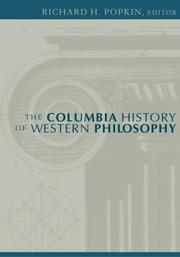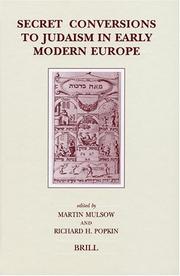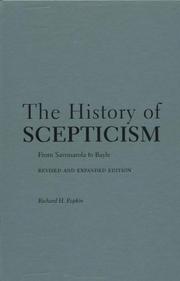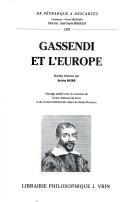| Listing 1 - 4 of 4 |
Sort by
|

ISBN: 0231101295 0231500343 9780231500340 9780231101288 0231101287 9780231101295 Year: 1999 Publisher: New York
Abstract | Keywords | Export | Availability | Bookmark
 Loading...
Loading...Choose an application
- Reference Manager
- EndNote
- RefWorks (Direct export to RefWorks)
Richard Popkin has assembled 63 leading scholars to forge a highly approachable chronological account of the development of Western philosophical traditions. From Plato to Wittgenstein and from Aquinas to Heidegger, this volume provides lively, in-depth, and up-to-date historical analysis of all the key figures, schools, and movements of Western philosophy.
The Columbia History significantly broadens the scope of Western philosophy to reveal the influence of Middle Eastern and Asian thought, the vital contributions of Jewish and Islamic philosophers, and the role of women within the
Philosophy - History. --- Philosophy -- History. --- Philosophy & Religion --- Philosophy --- History --- History.

ISBN: 128046710X 9786610467105 1423712145 9047401840 9781423712145 9789047401841 9789004128835 9004128832 9004128832 Year: 2004 Publisher: Leiden Boston Brill
Abstract | Keywords | Export | Availability | Bookmark
 Loading...
Loading...Choose an application
- Reference Manager
- EndNote
- RefWorks (Direct export to RefWorks)
This volume deals with conversions to Judaism from the 16th to the 18th century. It provides six case studies by leading international scholars on phenomena as crypto-Judaism, "judaizing", reversion of Jewish-Christian converts and secret conversion of non-Jewish Christians for intellectual reasons. The first contributions examine George Buchanan and John Dury, followed by three studies of the milieu of late seventeenth-century Amsterdam. The last essay is concerned with Lord George Gordon and Cabbalistic Freemasonry. The contributions will be of interest for intellectual historians, but also historians of political thought or Jewish studies. Contributors include: Elisheva Carlebach, Allison P. Coudert, Martin Mulsow, Richard H. Popkin, Marsha Keith Schuchard, and Arthur Williamson.
Jewish converts from Christianity --- Conversion --- RELIGION --- Religious conversion --- Psychology, Religious --- Proselytizing --- Converts from Christianity to Judaism --- History --- Judaism --- Rituals & Practice.

ISBN: 1280452935 0198026714 0195355393 1423761251 9780195355390 9780198026716 9781423761259 9780195107678 0195107675 9780195107685 0195107683 0197730507 Year: 2003 Publisher: Oxford New York Oxford University Press
Abstract | Keywords | Export | Availability | Bookmark
 Loading...
Loading...Choose an application
- Reference Manager
- EndNote
- RefWorks (Direct export to RefWorks)
This work has been revised and expanded throughout with three new chapters on Savonarola, Henry More and Ralph Cudworth, and Pascal. This authoritative treatment of the theme of scepticism and its historical impact should appeal to scholars and students of early modern history now as much as ever.
Skepticism --- History.


ISBN: 2345001283 2711613062 Year: 2021 Publisher: Paris : Vrin,
Abstract | Keywords | Export | Availability | Bookmark
 Loading...
Loading...Choose an application
- Reference Manager
- EndNote
- RefWorks (Direct export to RefWorks)
Difficile à lire, connu de réputation pour ses objections aux Méditations de Descartes, sa réhabilitation d’Épicure et des atomes, voire le caractère ambigu de ses relations avec les “libertins”, Pierre Gassendi est un personnage un peu flou dans notre galerie de portraits imaginaire. Il fut cependant un auteur important, lu, connu, approuvé ou critiqué dans toute l’Europe, surtout par les savants qui voulaient fonder efficacement leur physique moderne sans renier pour autant les acquis des anciens. Les études réunies ici ont cherché comme la trace et le reflet de l’œuvre de Gassendi dans les écrits d’autres auteurs qui ont vécu de son temps et jusqu’à la fin des Lumières – non seulement en France –, mais aussi en Angleterre (comme Walter Charleton, John Locke, David Hume ou Robert Boyle), en Hollande (professeurs d’Université), en Allemagne (Leibniz), en Pologne (Sociniens et “libertins”), en Italie du Nord (comme le jésuite milanais Thommaso Ceva), en Italie du Sud (comme le fondateur de l’Accademia degli Investiganti Tommaso Cornelio ou Giambattista Vico), en Espagne enfin (comme le médecin Martínez). Aujourd’hui encore Gassendi fait des adeptes parmi ceux que séduisent les chemins non battus de l’effort gratuit et de l’érudition austère, ceux que ravit absolument une certaine esthétique baroque de l’esprit pur.
History & Philosophy Of Science --- Medieval & Renaissance Studies --- Renaissance --- philosophie
| Listing 1 - 4 of 4 |
Sort by
|

 Search
Search Feedback
Feedback About UniCat
About UniCat  Help
Help News
News